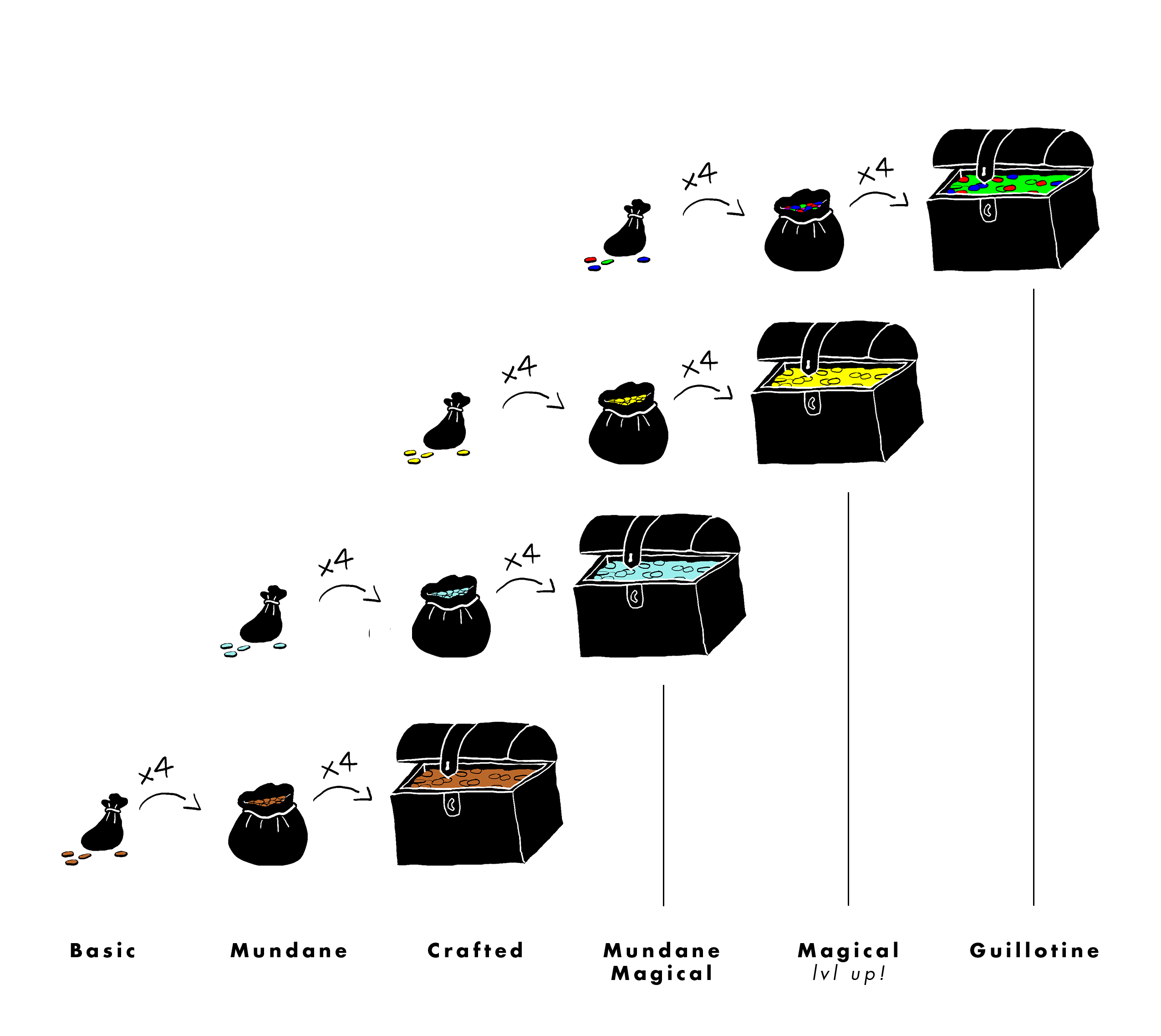Simple Currency System
I like treasures as a driver for adventure, but I don’t want to think about the precise value of things when I run a game. That’s why I have been functioning with “Bags of Gold Coins” as a currency instead of “Gold Coins” for a while now. That way I could speed up shopping segments by saying things like “Oh, you have a bag of gold coins? You can get 4 weapons or pieces of armour from this blacksmith.” Over the last two years, I realized my currency abstraction system needed to be able to express 3 things at my table: Big quantities of coins; pocket change; and five price tags to cover everything. This is how it evolved.
The Coin Quantity System
This is the simplest, most barebone version of the system. Everything purchasable has the value of either a purse of coins, a bag of coins, or a chest full of coins. There are four bags in a chest and four purses in a bag. A chest is what one single player needs to level up.

One purse of gold coins allows you to buy one common adventuring expense such as a sword, a piece of armour, a week stay in an inn, a bundle of torches, etc. A bag of gold coins could get you a minor magical object, like a potion or a scroll, and takes 1 inventory slot. A chest is what one single player needs to level up.
This way, planning loot is easy: a dungeon should have the equivalent of as many chests full of coins as there are players. You can stop reading here if you are happy with that.
The Coin Quality System
The above system works just fine. However, it becomes awkward when dealing with very low values: Players love to loot bodies they “find” along the way, expecting a reward, but too many purses of gold make mindless murder too lucrative an endeavour, while giving nothing to loot instead is simply not fun.
For this reason, I tried to deepen the Purse-Bag-Chest system by adding back the classic D&D coin types: a purse full of gemstones is worth four purses of gold coins, which is worth four purses of silver coins, which in turn is worth four purses of copper coins.

With these added, the smallest value is a purse of copper coins. This would allow a basic meal or a single night in a shitty inn. A purse full of silver coins would then get you any mundane tool cheaper than a metal sword.
This system could also be standalone, with 4 purses full of gems giving one level up. However, it becomes a little awkward when you need big quantities of coins.
There are only 5 price tags in D&D
Over the course of my games, I seem to have settled on 5 types of item worth: Basic, Mundane, Crafted, Mundane Magical, and Magical (which is the value of a level-up in an XP-as-Gold system). Any cost above that implies world-changing powers or scale that warrant something more than just a monetary transaction. Also, I’ve never seen a player that did not want to level up their character instead.
Big things like a tower or a boat should be considered a party expense. If you think acquiring them is well worth an adventure, make them cost a chest of gold per one or two player.

Values
Basic Item
Purse of Copper Coins
A meal, a night at the inn, gossip, a torch, etc.
Mundane Item
Purse of Silver Coins, Bag of Copper Coins
A knife, a shovel, 60’ rope, an errand, etc.
Crafted Item
Purse of Gold Coins, Bag of Silver Coins, Chest of Copper Coins
A sword, a helmet, a breastplate, a horse, a luxury item, a bribe, etc.
Magical Mundane Item
Purse of Gems, Bag of Gold Coins, Chest of Silver Coins
A potion, a scroll, a poison, a hireling, a permit, a mithral crafted item, etc.
Magical Item
Bag of Gems, Chest of Gold Coins
An enchanted weapon, a deed, a prophecy, a level up, etc.
